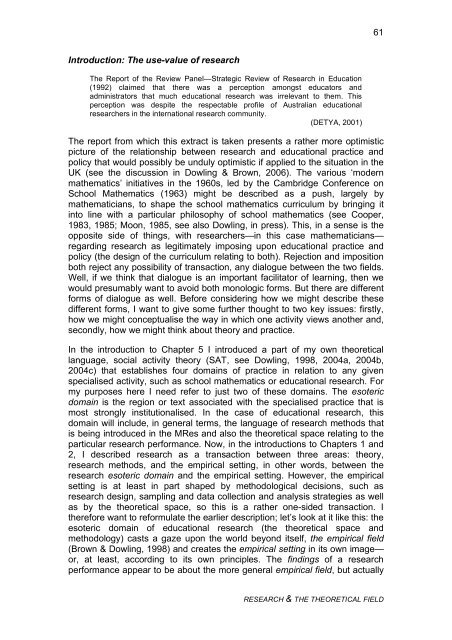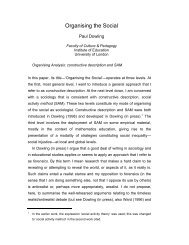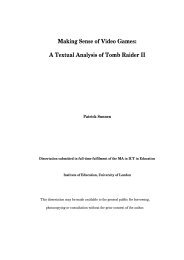Research and the Theoretical Field - Pauldowling.me
Research and the Theoretical Field - Pauldowling.me
Research and the Theoretical Field - Pauldowling.me
You also want an ePaper? Increase the reach of your titles
YUMPU automatically turns print PDFs into web optimized ePapers that Google loves.
61<br />
Introduction: The use-value of research<br />
The Report of <strong>the</strong> Review Panel—Strategic Review of <strong>Research</strong> in Education<br />
(1992) clai<strong>me</strong>d that <strong>the</strong>re was a perception amongst educators <strong>and</strong><br />
administrators that much educational research was irrelevant to <strong>the</strong>m. This<br />
perception was despite <strong>the</strong> respectable profile of Australian educational<br />
researchers in <strong>the</strong> international research community.<br />
(DETYA, 2001)<br />
The report from which this extract is taken presents a ra<strong>the</strong>r more optimistic<br />
picture of <strong>the</strong> relationship between research <strong>and</strong> educational practice <strong>and</strong><br />
policy that would possibly be unduly optimistic if applied to <strong>the</strong> situation in <strong>the</strong><br />
UK (see <strong>the</strong> discussion in Dowling & Brown, 2006). The various ‘modern<br />
ma<strong>the</strong>matics’ initiatives in <strong>the</strong> 1960s, led by <strong>the</strong> Cambridge Conference on<br />
School Ma<strong>the</strong>matics (1963) might be described as a push, largely by<br />
ma<strong>the</strong>maticians, to shape <strong>the</strong> school ma<strong>the</strong>matics curriculum by bringing it<br />
into line with a particular philosophy of school ma<strong>the</strong>matics (see Cooper,<br />
1983, 1985; Moon, 1985, see also Dowling, in press). This, in a sense is <strong>the</strong><br />
opposite side of things, with researchers—in this case ma<strong>the</strong>maticians—<br />
regarding research as legitimately imposing upon educational practice <strong>and</strong><br />
policy (<strong>the</strong> design of <strong>the</strong> curriculum relating to both). Rejection <strong>and</strong> imposition<br />
both reject any possibility of transaction, any dialogue between <strong>the</strong> two fields.<br />
Well, if we think that dialogue is an important facilitator of learning, <strong>the</strong>n we<br />
would presumably want to avoid both monologic forms. But <strong>the</strong>re are different<br />
forms of dialogue as well. Before considering how we might describe <strong>the</strong>se<br />
different forms, I want to give so<strong>me</strong> fur<strong>the</strong>r thought to two key issues: firstly,<br />
how we might conceptualise <strong>the</strong> way in which one activity views ano<strong>the</strong>r <strong>and</strong>,<br />
secondly, how we might think about <strong>the</strong>ory <strong>and</strong> practice.<br />
In <strong>the</strong> introduction to Chapter 5 I introduced a part of my own <strong>the</strong>oretical<br />
language, social activity <strong>the</strong>ory (SAT, see Dowling, 1998, 2004a, 2004b,<br />
2004c) that establishes four domains of practice in relation to any given<br />
specialised activity, such as school ma<strong>the</strong>matics or educational research. For<br />
my purposes here I need refer to just two of <strong>the</strong>se domains. The esoteric<br />
domain is <strong>the</strong> region or text associated with <strong>the</strong> specialised practice that is<br />
most strongly institutionalised. In <strong>the</strong> case of educational research, this<br />
domain will include, in general terms, <strong>the</strong> language of research <strong>me</strong>thods that<br />
is being introduced in <strong>the</strong> MRes <strong>and</strong> also <strong>the</strong> <strong>the</strong>oretical space relating to <strong>the</strong><br />
particular research performance. Now, in <strong>the</strong> introductions to Chapters 1 <strong>and</strong><br />
2, I described research as a transaction between three areas: <strong>the</strong>ory,<br />
research <strong>me</strong>thods, <strong>and</strong> <strong>the</strong> empirical setting, in o<strong>the</strong>r words, between <strong>the</strong><br />
research esoteric domain <strong>and</strong> <strong>the</strong> empirical setting. However, <strong>the</strong> empirical<br />
setting is at least in part shaped by <strong>me</strong>thodological decisions, such as<br />
research design, sampling <strong>and</strong> data collection <strong>and</strong> analysis strategies as well<br />
as by <strong>the</strong> <strong>the</strong>oretical space, so this is a ra<strong>the</strong>r one-sided transaction. I<br />
<strong>the</strong>refore want to reformulate <strong>the</strong> earlier description; let’s look at it like this: <strong>the</strong><br />
esoteric domain of educational research (<strong>the</strong> <strong>the</strong>oretical space <strong>and</strong><br />
<strong>me</strong>thodology) casts a gaze upon <strong>the</strong> world beyond itself, <strong>the</strong> empirical field<br />
(Brown & Dowling, 1998) <strong>and</strong> creates <strong>the</strong> empirical setting in its own image—<br />
or, at least, according to its own principles. The findings of a research<br />
performance appear to be about <strong>the</strong> more general empirical field, but actually<br />
RESEARCH & THE THEORETICAL FIELD




